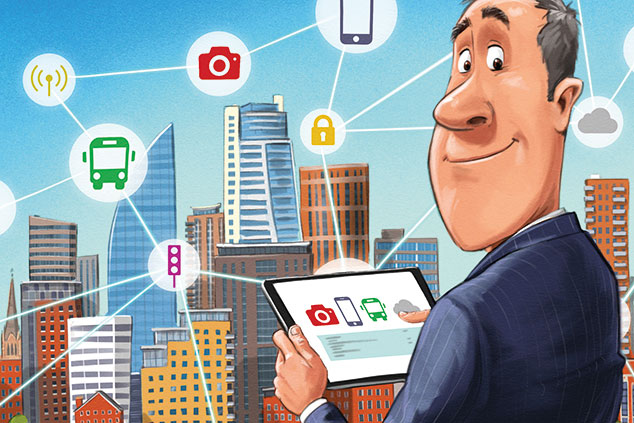
The “smart city” is no mere futuristic fantasy, but a work in progress. Chris Carter analyses the trend’s rapid development and explains how you can profit from it.
The lights in the bedroom gradually brighten and you wake up feeling refreshed. You know you’ve slept well: the fitness and sleep tracker on your wrist says so. Downstairs in the kitchen, your refrigerator places an order for more orange juice just as you upend the last drop from the carton into your glass. The coffee-maker gurgles into action right on cue. After breakfast, the mirror in the bathroom bids you good morning and informs you that road-traffic sensors are reporting light traffic, while the leaves on the railway lines have been swept away. All trains are running on time. Oh, and the weather will be warm. So might the wardrobe suggest you wear summer clothes today? The sun is shining as you step outside. The car has charged overnight, when electricity is cheaper. It starts with a hum at the press of a button and you’re off on your way to work.
A technological ecosystem
Thus begins a typical day in a “smart city”, which uses technology in an interconnected way to make life better and smoother for everyone. In some ways, the smart city is the logical end point to the so-called “internet of things” (IoT), whereby everything from your kettle to vacuum cleaner is hooked up to the internet. Your own environment is seamlessly connected to the city’s. “I do not see a smart city as a top-down planning exercise, but as an ecosystem,” Carlo Ratti of the Massachusetts Institute of Technology Senseable City Lab, and co-chair of the World Economic Forum’s Global Future Council on Cities and Urbanisation, tells The Economist Intelligence Unit. It’s an ecosystem in which we can all hope to thrive.
Most of the technology underpinning a smart city already exists or is being trialled – in a city near you.
London, for instance, has “taken great steps already”, as Mayor Sadiq Khan noted in the foreword to his Smarter London Together document last summer. “But I want us to do even more to utilise data and smart technology to meet the needs of our citizens,” he continued. “I see London’s future as a global ‘test-bed city’ for civic innovation, where the best ideas are developed, amplified and scaled.” It all has the air of some Silicon Valley visionary billionaire giving a TED talk to a roomful of open-mouthed acolytes. Khan wants London to become “the smartest city in the world”. Smarter London Together seeks to use information and communication technologies (ICT) not only to solve the biggest problems facing the city – any big city – in the 21st century, but also to improve efficiency in terms of money and energy use.
Subscribers can read it in the digital edition or app